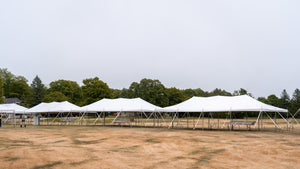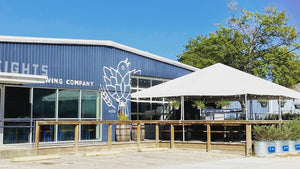
Small business owners know that relationships are an essential part of generating revenue. Whether improving employee retention, fostering customer loyalty, or making new connections, building solid relationships is critical to every small business's bottom line.
Since the best way to build relationships is face-to-face, events for small businesses are an essential part of doing business. Hosting an event for a small business is just as important for employees as it is for potential current clients.
To small business owners, every dollar counts, and investing in tents for events is one way to ensure maximum ROI. Keep reading to learn how to host a business event.
Types of Events Small Businesses Can Host
Before we offer tips on how to host a community event, you'll first want to decide on the type of event based on your small business goal:
- Award ceremonies: Show employee appreciation.
- Happy hours: Encourage employee socializing.
- Office holiday parties: Boost company morale.
- Fundraising events: Raise money for a charitable cause or business endeavor.
- Sponsorship events: Provide financial assistance to an event to achieve promotional advantages.
- Guest speaker events: Have a single speaker present a talk on an exciting and relevant topic.
- VIP experiences: Aimed at your decision-makers or most valuable clients, these events provide an exclusive experience.
- Client events: Opportunities to show your favorite clients appreciation.
- Lunch events: Offer a welcome break during the working day.
- Seminars or workshops: Bring together like-minded people with similar interests.
- Networking events: When combined with other activities, these corporate events reduce the stress of meeting new business collaborators and clients.
Hosting business events doesn't have to be complicated, even if it's for employees. You'd be amazed at how much a free pizza day can improve company culture and show your employees that you value their input. If you need help determining what type of event your employees would prefer, provide them with a survey with options to choose from.
Hosting Events for Your Business: 8 Benefits
Hosting events exposes your business to the right customers. Whether it's a large or small event, sharing experiences with clients, employees, and industry peers will benefit your business in many ways. Here are the main benefits of hosting a business event, among others:
#1. Brand Awareness
Small businesses often have significant competition, which is why brand awareness and loyalty are so important. Creating brand awareness isn't always easy, but branded items, such as key chains, t-shirts, pens, and mouse pads, help keep your brand in front of your customers - and potential customers' - eyes. The same is true for events for corporate events.
Special events set the tone for your brand and are a memorable way to increase brand awareness. When planning events, look for tents customized to your brand. The good news is that if you invest in a quality tent, you can reuse the tent for regular themed events.
#2. Customer Acquisition
Customers tend to purchase goods and services based on personal relationships. The good news is that your event doesn’t have to be an extravagant affair. It can be as simple as inviting existing customers to a cookout and asking them to bring a friend who might want to learn more about your business.
Reasons for events could be customer appreciation or special promotions for new customers. Let’s face it, everyone loves getting free merchandise, so include plenty of marketing trinkets at your event.
#3. Credibility
Bringing community members together with your team will give your small business credibility that an email or mail flier could never accomplish.
If your small business is a David competing with a Goliath conglomerate, networking events will give you an unbeatable competitive advantage.
It’s also an opportunity to network with your peers and find ways to leverage those relationships that will benefit your business and theirs.
#4. Educate Employees

Often, team-building events focus on abstract challenges that can be applied to the workplace. However, you should also organize staff training specific to different departments and roles.
For example, organizing a company event around a new product, service, or feature your business is about to launch to educate your clients and staff makes sense. Broadcasting new business information at a single event is easier than updating separate teams.
#5. Additional Revenue
Organizing company events may seem unnecessary to business people concerned with the bottom line, and for a good reason. A hint: It's mainly because poorly executed events won't make money.
But that's not the case if you plan the event correctly. Sell sponsorships, ad space, VIP tickets, and merchandise; you'll break even and create additional revenue. This is one of many benefits of corporate events.
#6. Publicity
One of the best ways to grow your business is through publicity. However, producing commercials for television or radio can be costly. Thus, among the many benefits of hosting an event, free publicity is a huge one.
Posting your event on social media channels, such as Facebook and LinkedIn, is free and can reach an audience of hundreds, if not thousands, of potential customers. You also can send a press release to local media outlets and generate more free publicity. Encourage your customers to share your posts on their social media feeds to multiply their reach.
#7. Employee Morale Boost
You need every tool available to attract new employees and increase employee retention. Hosting events is a great way to introduce your business and its company culture to potential recruits. It’s also an excellent way to make your employees feel appreciated and strengthen team cohesion.
Reasons to celebrate include reaching business milestones, retirements, birthdays, employee anniversaries, and holidays. When your employees know that you care about them outside of the work environment, they will feel more valued and motivated to work.
#8. Marketing Strategy Expansion
Using events as a tool to promote products and services is nothing new. So much so that the term “event marketing” refers to using events as marketing and not the marketing of events.
In the short term, your product or service might solve a problem for your customers, but an event helps them associate your brand with a positive experience.
How to Plan a Business Event?

You should think strategically if you want measurable ROI for your event. Consider who you wish to attend and also their WIIFM - what's in it for me?
Put yourself in your attendees' shoes and ask yourself that question. Plan accordingly to what is essential to your customers and their lifestyles.
After all, hosting a corporate event should be about them and how your small business can benefit them. What do you need to do to host an event?
Step 1 - Understand the Purpose of Your Event
Once you've identified your goals and expectations, you can determine what event will resonate with your intended audience. Some things to consider when hosting an event: Do you want to raise brand awareness and network with the local community to boost team spirits? Instead of seeing it as a corporate event, consider it an interactive brand experience.
Step 2 - Decide on Your Audience
A crucial part of the planning process is defining your target audience. Is it your company's executives, upper management, business partners, or community members? Are you targeting existing clients or potential clients? It may be a combination of all of the above. To have a successful event, you must identify your target audience and understand how to reach them. You can then tailor your event to suit their interests and needs.
Step 3 - Set a Realistic Budget
The sort of event you can produce depends on how much money you have to spend. Knowing where to allocate most of your resources is essential once you have a budget. Considering attendees with dietary restrictions and not skimping on food or beverages is advisable. An audience is more interactive when they aren't hungry or thirsty.
Step 4 - Choose a Theme and Format
Once you have established your objectives and defined your audience, you can select a theme for the event and determine the most effective way to present it. A successful corporate event is immersive and educational, putting attendees in front of the right people for networking and learning. Think about how your event will differ from similar ones or even those you have already produced.
Step 5 - Establish a Project Timeline
Your budget determines the timeline of your project. In cases where you are working on a tight budget, giving yourself more time to organize the event will reduce costs and expenses. Organizing an event requires keeping track of a wide range of tasks, which can be streamlined by creating a detailed checklist using online project management software.
Step 6 - Select a Location

The venue you choose should bring your event to life. For attendees to feel comfortable and willing to travel, you must select a venue in a convenient area with a lively atmosphere. If you're on a tight budget, try hosting the event at a less busy time when the venue may be available, or if possible, have it at your office.
Step 7 - Plan the Logistics
Decide on an agenda for the event and ensure everyone on your team knows what aspects of the day they are responsible for. Make sure you balance keeping attendees engaged and giving them some freedom in their schedule. Remember, your attendees need time to process their learning, recharge, and have productive conversations.
Step 8 - Make Use of Technology
Wondering how to host a business event with the least stress? Several event management platforms and apps exist today (some of which offer a free base product) that can do everything from facilitating on-site check-in of attendees to adding virtual reality games and simulations to workshops and presentations. In addition to keeping your affair on track, event management software and project management software makes working with vendors and other creative partners easier.
Step 9 - Promote Your Event
If people don’t know about your event, no one will show up, so it’s imperative to find creative ways to get the word out. In order to maximize the success of your corporate event, you should plan its promotion as if you were executing a marketing plan. You can even rope in marketing strategy staff.
Step 10 - Review and Follow Up
Send final payments to vendors, reconcile your finances, and conduct a post-event debrief with your team. The most important thing is to get feedback from guests. If you have an event-planning app with a feedback option, you can use it to send a simple customer satisfaction survey. This information determines the overall performance and informs future corporate events.
Need a Tent for Your Next Event?
Small business events are some of the best opportunities to get your brand in front of a large crowd of potential customers and actively engage with them, get feedback, and make sales in real time. Make your small business event tent stand out by choosing the best possible tent.
Now that you know how to host a business event, you might want to create a branded canopy tent for your next customer event. At American Tent, we can custom build a tent to your preferences and specifications. Our team has a proven track record and looks forward to working with you - contact us today to get started!









